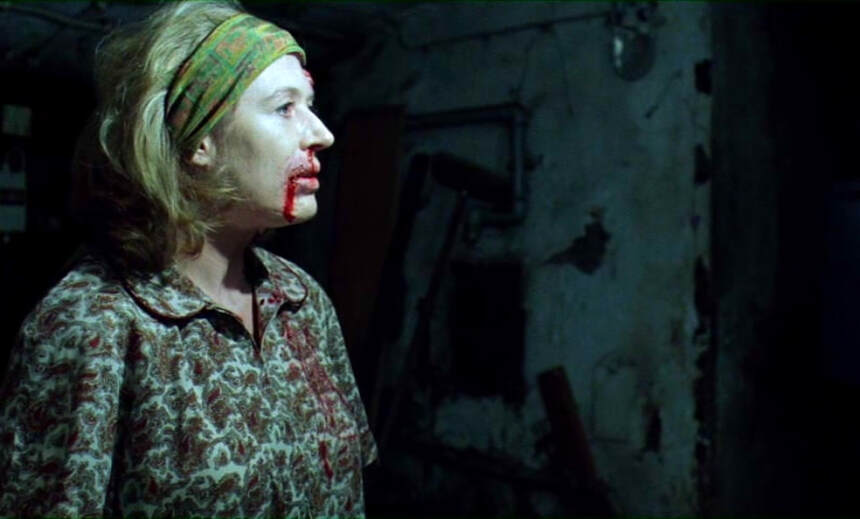|
Almodovar's signature aesthetic vibrancy harmonizes beautifully with narrative and thematic ambitions in Pain & Glory, a rich tapestry of mortality which follows the growing despondency of an aging artist who reflects on his past. A sprawling and exhaustive examination, Pain & Glory contextualizes this man with a narrative that is seamless in its transitions through time and space, never being pedantic to the audience while revealing the vast layers - the letdowns and triumphs- which define his identity and current state of being. Melancholy is a major component of this film and yet there is an ethereal quality to its construction as Almodovar astutely exhibits how pain isn't an adversary of life but complementary, a part of the journey which can also give life meaning - the past and the present both holistically forming the soul of this man. In the film's final denouement, Almodovar reinforces this fact while completely subverting expectations, with Pain & Glory being arguably an ode to cinema (or art) itself, detailing the therapeutic nature of art and personal expression as the ultimate act of autonomy, one in which the individual wrestles with the ontological through creativity.
0 Comments
A post-WWII America historiography purveyed through the exploits of a silent generation aged mob enforcer, Martin Scorsese's The Irishman is undoubtedly one of the filmmakers most ambitious endeavors. Using the filmmaker's familiar mob-based narrative structuralism as an artifice for examining American culture and the shifting dynamics which take place within it, Scorsese's depiction of Post-WWII America finds machismo embedded into any notions of progress. Through the lens of its main protagonist, Frank Sheeran, a mob hitman, the film depicts the debilitating nature such crude dynamics place on the individual and the culture at large. Machismo is presented as a blinding force, a primal intuition which subverts reflection or introspection, serving as a perfect accomplice to the vicissitudes of power which ultimately seek control through authority and the disruption of collective consciousness. Such intrusive forces ultimately subvert and disrupt the empathetic nature of the human condition, and in the case of Frank Sheeran it leads him to a place of alienation from those he loves the most - his family. Frank is a character who is completely blinded by the man he has become, corrupted by this lifestyle in which pride, strength, and aggression are rewarded. This corrosive way-of-life leaves him completely alienated in the end, with his daughter being the whole fulcrum to the emotional and arguably thematic arch of this story - a character who grows up in the shadows of such violence and aggression. Beautifully portrayed by Anna Paquin, this character represents the empathetic nature of the human condition; She represents purity and innocence, and her fear of her father quickly grows into outright disdain, incapable of accepting her father's mindset - one sculpted by such notions of machismo and power. In a sense, Martin Scorsese's The Irishman is the filmmaker's magnum opus, an accumulation of his various gangster films that feels particularly salient due to its introspective mapping of post-War Americana.
An immersive, exhaustive investigation of the carceral state, Brett Story's The Prison in Twelve Landscapes meditative yet tactical, exposing the degradation of a system in which punishment is paramount and rehabilitation is a facade in which little support is allocated. The film's structuralism features a series of vignettes, each standing alone as observant, humanistic exposes into the lives effected by such a system. These vignettes form a holistic whole, detailing the vastness of such a system and how this broad state network effects so many aspects of life through exploitation - the state profiting off the mystery of its own citizens. From prison labor to stop-and-frisk, The Prison in Twelve Landscapes is a calm yet piercing evocation on the state of the prison industrial complex in America
While not as incisive or transcendent as Driver's Sleepwalk, When Pigs Fly explores similar themes in a more accessible framework, employing the ghost story archetype to tell its tale of domestic abuse and retribution. Defying strict genre classification, When Pigs Fly is somber yet sweet, playful yet piercing, finding a balanced approach in its evocation on the unseen violence which lurks in shadows of society. Visually inventive in its visual designs which evoke the supernatural world of its story in a fresh and effective way, the linear narrative framework of When Pigs Fly never feels generic, tedious, or saccharine, a testament to Sara Driver's ability as a storyteller.
|
AuthorLove of all things cinema brought me here. Archives
June 2023
|




 RSS Feed
RSS Feed
